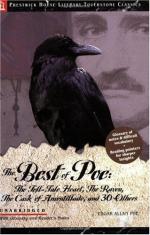|
This section contains 11,694 words (approx. 39 pages at 300 words per page) |

|
SOURCE: Pahl, Dennis. “De-composing Poe's ‘Philosophy.’” Texas Studies in Language and Literature 38, no. 1 (spring 1996): 1-25.
In the following essay, Pahl closely examines both “The Raven” and Poe's essay, “The Philosophy of Composition.”
Given the way Poe's fictional works have so persistently attracted the serious attention of language-related theorists—from Charles Baudelaire in the nineteenth-century to Jacques Lacan and Jacques Derrida in the twentieth—it is somewhat surprising that few have ever bothered to examine closely Poe's own theory, especially as set forth in his most forcefully argued essay, “The Philosophy of Composition” (See Lloyd 48-81; “Seminar”; “Purveyor”).1 Why should this be?
No doubt one reason could be that “The Philosophy” has traditionally been discredited as but another of the many hoaxes Poe is supposed to have perpetrated against an unsuspecting readership—its overall purpose being less to reveal the true method of the composition of “The Raven” than...
|
This section contains 11,694 words (approx. 39 pages at 300 words per page) |

|


